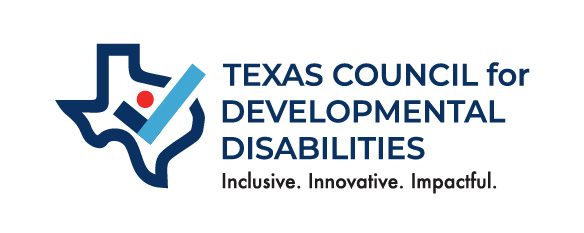NorTex 2023 Spring Newsletter
April 30, 2023 • NorTex
Improving education and practice guidelines for substance use disorder among people with developmental disabilities
 NorTex is excited to continue our efforts to improve outcomes for people with developmental disabilities who experience substance use disorder through a new initiative funded by the Texas Council for Developmental Disabilities. The project, titled “Improving Education and Practice Guidelines for Substance Use Disorder and Developmental Disabilities,” includes a collaboration between NorTex, the Texas College of Osteopathic Medicine and the College of Public Health at The University of North Texas Health Science Center at Fort Worth, the John Peter Smith Health Network and community partners.
NorTex is excited to continue our efforts to improve outcomes for people with developmental disabilities who experience substance use disorder through a new initiative funded by the Texas Council for Developmental Disabilities. The project, titled “Improving Education and Practice Guidelines for Substance Use Disorder and Developmental Disabilities,” includes a collaboration between NorTex, the Texas College of Osteopathic Medicine and the College of Public Health at The University of North Texas Health Science Center at Fort Worth, the John Peter Smith Health Network and community partners.
People with developmental disabilities experience health inequalities compared with the general population. These inequalities likely leave
people with developmental disabilities vulnerable to substance use and abuse. Research on substance use disorder among people with developmental disabilities is limited. There are gaps in knowledge in areas such as prevention of substance use disorder for individuals with developmental disabilities, best treatment practices, and comorbid mental health conditions commonly seen in individuals with developmental disabilities and substance use disorder. Individuals with a developmental disability are less likely to use substances compared with others without a disability; however, they are more susceptible to substance abuse if they do use them. Additionally, they are less likely to receive or adhere to substance use disorder treatment. While research suggests that treatment for substance use disorder should be individualized for people with developmental disabilities, there is a lack of empirical evidence regarding prevention and treatment programs that are effective for this vulnerable population. Essentially, there are no standardized practice guidelines or training materials that include substance use disorder treatment for people with developmental disabilities.
Our project is innovative because it will be informed by an interdisciplinary group that includes providers who care for substance use disorder and developmental disabilities populations, administrators, people with lived experiences with substance use disorder and developmental disabilities, and caregivers. This provides the opportunity to bridge gaps between professions and highlight the needed cultural competencies to address developmental disabilities and substance use disorder specific attributes. To accomplish our goals, we will address gaps in knowledge, training and clinical practice guidelines for people with comorbid developmental disabilities and substance use disorder in Texas. We will accomplish this by developing interdisciplinary training materials and practice guidelines for health care providers that deliver services for substance use disorder and for health care providers that deliver care for people with developmental disabilities. We will also distribute the training materials and practice guidelines to stakeholders throughout Texas. Practice guidelines will include a team-based approach to provide high-quality care that incorporates the needs of both the developmental disabilities and substance use disorder populations.
This work is supported by the Texas Council for Developmental Disabilities through a grant from the U.S. Administration for Community Living (ACL), Department of Health and Human Services (HHS), Washington, D.C. 20201, with a 100% federal funding award totaling $6,121,860. Council efforts are those of the grantee and do not necessarily represent the official views of nor are endorsed by ACL, HHS, or the U.S. government.
PI: Kimberly Fulda, DrPH; Co-Investigators: Tracey Barnett, PhD; Scott Walters, PhD.
NORTEX RESEARCH PROJECTS
FEATURED CURRENT NORTEX PROJECT
Factors influencing parents’ decision to use complementary and alternative medicine therapies in children with chronic conditions
Chronic conditions in pediatric populations often come with many additional symptoms such as pain, mood disorders and/ or fatigue. The Centers for Disease Control and Prevention currently estimates that more than 40% of adolescents and school-aged children have at least one chronic health condition. Parents may choose to use complementary and alternative medicine therapies to help manage some of these symptoms, and sometimes treat the condition(s).
While there is some known information regarding what factors influence a parent’s decision to use CAM therapies for their child, such as physician discussion and socioeconomic status, it is limited. Furthermore, literature demonstrates that there is often a disconnect in communication between parents and the child’s physician regarding discussion of the usage of CAM therapies in the child’s treatment plan. This disconnect leads to the question of how to better understand some of the potential factors that may influence a parent’s or caregiver’s decision to use CAM therapies. Finding this information can potentially be used to better understand the use of CAM therapies and possibly increase aid in the decision-making process. Additionally, it may help physicians in discussing or recommending CAM therapies for their patients. Inversely, this information can potentially be used to form informative guides on CAM therapies and what their uses can be for patients, or parents of patients, based on the factors explored.
Aliyah Munshi, a second-year Master of Medical Sciences student at HSC, is exploring potential factors that may influence, or de-influence, a caregiver to use CAM therapies for their child with chronic condition(s) through a research study survey.
FEATURED COMPLETED NORTEX PROJECT
Defining and enhancing collaboration between community pharmacists and primary care providers to improve medication safety
 Introduction: More than 4 billion prescriptions are dispensed each year to patients in the United States, with the number of prescriptions continuing to increase. There is a growing recognition of pharmacists’ potential in improving medication safety in community settings in collaboration with primary care providers. However, the nature of collaboration has not been well defined, and barriers and strategies are not articulated.
Introduction: More than 4 billion prescriptions are dispensed each year to patients in the United States, with the number of prescriptions continuing to increase. There is a growing recognition of pharmacists’ potential in improving medication safety in community settings in collaboration with primary care providers. However, the nature of collaboration has not been well defined, and barriers and strategies are not articulated.
Area covered: For this narrative review, published studies were retrieved from PubMed between January 2000 and December 2020. Search terms included “patient safety,” “medication safety,” “collaboration,” “primary care physician” and “community pharmacy.” Resulting articles were categorized as follows: defining collaboration, types of collaboration, and barriers and solutions to collaboration.
Expert opinion: It is important to understand the factors within a community pharmacy setting that limit or facilitate community pharmacists’ participation in medication safety activities. Strategies such as medication review are a common form of collaboration. Barriers to collaboration include misconceptions regarding roles and differences in access to clinical information and community pharmacy practice variability. Future recommendations include increasing training and utilization of pharmacists/PCP teams, increasing community pharmacists’ practice in emerging roles, and expanding the community pharmacist role in transitions of care from the hospital to the community.
Keywords: Medication safety; collaboration; community pharmacists; older adults; primary care physicians.
Published in: Expert Opinion on Drug Safety; Primary Author: Annesha White, PhD
TRAINING:
PARTNERING WITH VACCINE-HESITANT PATIENTS
 NorTex has partnered with a multidisciplinary team led by Dr. Shane Fernando at HSC to improve COVID-19 vaccination rates in hard-to-reach communities. Part of this project is to provide training to health care providers on how to communicate with vaccine-hesitant patients. The training covers communication with any vaccine-hesitant patient. It is not specific to COVID-19 vaccinations. It takes less than 15 minutes to complete the training, and continuing education credits are available. A certificate of completion can be requested after completion. There is no cost for the continuing education credits, and anyone can complete the training. The training material was developed by Priya Bui, DO, and Sarah Matches, DO.
NorTex has partnered with a multidisciplinary team led by Dr. Shane Fernando at HSC to improve COVID-19 vaccination rates in hard-to-reach communities. Part of this project is to provide training to health care providers on how to communicate with vaccine-hesitant patients. The training covers communication with any vaccine-hesitant patient. It is not specific to COVID-19 vaccinations. It takes less than 15 minutes to complete the training, and continuing education credits are available. A certificate of completion can be requested after completion. There is no cost for the continuing education credits, and anyone can complete the training. The training material was developed by Priya Bui, DO, and Sarah Matches, DO.
The training can be accessed online at this website: https://rise.articulate.com/share/sZCcR2lfRq4xAjhD_9dsboGrVfI7UUG_#/
Full accreditation statements for continuing education credits for this activity are available here: https://unthsc.rievent.com/a/RGZLIT
ARLINGTON CHARITIES
NorTex has had the pleasure of volunteering for Arlington Charities. We are very proud of the work it is doing for the community, including for those who may be facing homelessness. Below are some of the services and programs it offers.
Supplemental groceries
Providing nutritious supplemental groceries is its main focus. This service is provided by drive-thru at its Secretary Drive address, mobile food markets, satellite pantry at Tarrant County Community College Southeast Campus or delivery service. Additionally, hygiene and household cleaning items are available.
 Lunch for those experiencing homelessness
Lunch for those experiencing homelessness
Lunch and hygiene products are provided to individuals in the Arlington area from 11:30 a.m. to 12:15 p.m. Mondays, Wednesdays and Fridays. They also may get a change of clothing as needed.
Educational classes
FREE educational classes include employment coaching, financial empowerment, English language classes and computer skills. Led by highly qualified and trained professionals, these classes will help clients attain economic stability and freedom.
Crisis assistance, case management, & referral information
Arlington Charities also helps in times of local emergencies (i.e. storms, fires, etc.). A case manager is available to work with clients to provide support services and referrals to agencies and resources in the community.
For more information about Arlington Charities, visit: arlingtoncharities.org
FEATURED MEMBER
Dr. Patricia Rodriguez
 Dr. Rodriguez is a board-certified pediatrician currently serving as chief medical officer for the North Texas Area Community Health Center. She is a passionate health care advocate for vulnerable and underserved patient populations, but also possesses a strong combination of health care insight and expertise in community health, health care quality and safety, as well as health equity. Past experiences for Rodriguez include being chief health equity and inclusion officer at one of the largest pediatric health care providers in the United States prior to joining NTACHC.
Dr. Rodriguez is a board-certified pediatrician currently serving as chief medical officer for the North Texas Area Community Health Center. She is a passionate health care advocate for vulnerable and underserved patient populations, but also possesses a strong combination of health care insight and expertise in community health, health care quality and safety, as well as health equity. Past experiences for Rodriguez include being chief health equity and inclusion officer at one of the largest pediatric health care providers in the United States prior to joining NTACHC.
NTACHC is the only federally qualified health center in Tarrant County and boasts three outpatient facilities, strategically located in medically underserved areas, providing a wide range of primary care and preventative health services, an Eye Care Center, integrated behavioral health, lab services and a 340B pharmacy. As chief medical officer, Rodriguez provides clinical leadership, fosters superior quality patient care, develops strategic goals and new care models, standardizes clinical protocols, expands existing programs and contributes to the recruitment and retention of medical staff.
Rodriguez holds a Doctor of Medicine from the University of Texas McGovern Medical School and a Bachelor of Arts in Biology from Texas A&M University. She also completed her pediatrics residency at The University of Texas McGovern Medical School and is currently obtaining an Executive MBA in Healthcare Management at the University of Texas at Dallas as part of the Alliance for Physician Leadership program.



Social media